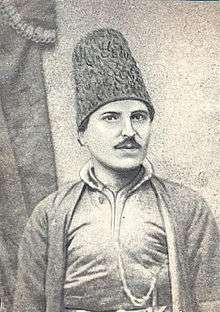Gasim bey Zakir
| Gasim bey Zakir | |
|---|---|
 | |
| Born |
1784 Panahabad, Azerbaijan |
| Died |
1857 Panahabad, Azerbaijan |
| Occupation | Poet |
Gasim bey Zakir (Azerbaijani: Qasım bəy Zakir) was Azerbaijani poet of 19th century and one of the founders of the critical realism and satirical genre in Azerbaijani literature.
Life
Zakir was born in 1784 in a noble family of bey in Panahabad, then the capital of the Karabakh khanate. Zakir belonged to the clan of Javanshir, which was the ruling clan in the Karabakh khanate. His grand grandfather Kazim-agha was the brother of Panah Ali khan – the founder of and the Karabakh khanate and its capital Shusha.
Zakir's childhood and youth comes to the period of upheavals in Azerbaijan, which was made the battlefield between Russia and Iran . After the Karabakh khanate became a part of the Russian Empire, Zakir served in the Caucasian Muslim cavalry regiment and distinguished himself in many battles. He had special deserts in preventing the Iranian troops from relocating the Azeri population of Karabakh to the inner parts of Iran. For his courage during the Russo-Iranian wars Zakir was awarded with the silver medal from the Russian Tsar.
From the 1830s Zakir, who spent his life mostly in the battlefields, settled down and began to run his household. For his straightforward and generous nature he was highly esteemed among the people. However, Zakir had many enemies too, whom he earned mainly because of his satirical verses. In his satirical poetry and fables Zakir lashed out at the vices then rampant in society, at the hypocrisy and bigotry of the clergy, at the venality of the Tsarist officials, the greed of merchants and the cruelty of the landowners. Zakir had been constantly persecuted for his satire. In 1849, under pretext that Zakir gave refuge to his relative who was in odds with the Russian government, he was exiled from Karabakh to Baku, his son and nephew were exiled to the inner parts of Russia and family left alone in Shusha. Only after several months did Zakir, with help of his friends, writer Mirza Fatali Akhundov, Georgian kniaz I. Orbeliani, and the governor of Baku M. Golyubyakin manage to return home, whereas his son and nephew lived in exile for three years. Zakir lived in need and under the police surveillance till his last days. Only in 1857 the authorities decided to allocate a pension for him "for his deserts before the Russian State ". But when this pension reached Shusha, the poet has already departed.
Creativity
Gasim bey was the prominent representative of critical realism of Azerbaijani literature in the first half of the 19th century. Gasim bey's poetry is characterized by diversity of genres. In lyric poetry the poet follows Molla Panah Vagif's traditions, writes gazals, goshmas, gerayli, in which he glorifies love. Zakir, the author of lyrics and beautiful patterns of love poetry, was famed for his satirical works. Zakir sharply criticized tsar's officers and arbitrariness of local beys (landlords) and clergies. Today Zakir's literary legacy has been preserved in verses ranging from sharply critical satire to the tender lyrics praising pure and passionate love.
| English Translation
Since your departure-O Inconstant One-
|